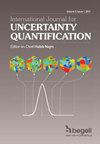基于方差的贝叶斯逆问题对先验分布的敏感性
IF 1.8
4区 工程技术
Q2 ENGINEERING, MULTIDISCIPLINARY
International Journal for Uncertainty Quantification
Pub Date : 2024-08-01
DOI:10.1615/int.j.uncertaintyquantification.2024051475
引用次数: 0
摘要
贝叶斯逆问题的提出涉及先验分布的选择;看似同样合理的选择可能会导致截然不同的结论。我们开发了一种计算方法,以更好地理解定义先验的超参数对相关量的后验统计的影响。我们的方法依赖于对定义先验的超参数进行贝叶斯逆问题的全局灵敏度分析(GSA)。然而,这是一个具有挑战性的问题--如果采用天真的双循环采样方法,则需要运行数量惊人的马尔可夫链蒙特卡罗(MCMC)采样程序。目前的研究工作迈出了奠基性的一步,通过(i)明智地结合高效代用模型和(ii)有针对性的重要度抽样方法,使这种敏感性分析切实可行。特别是,我们无需重复 MCMC 运行,就能对相对于先验超参数的后验预测统计量进行精确的 GSA。我们在一个简单的贝叶斯线性逆问题和一个由流行病学模型控制的非线性逆问题上演示了该方法的有效性。本文章由计算机程序翻译,如有差异,请以英文原文为准。
Variance-based sensitivity of Bayesian inverse problems to the prior distribution
The formulation of Bayesian inverse problems involves choosing prior
distributions; choices that seem equally reasonable may lead to significantly
different conclusions. We develop a computational approach to better
understand the impact of the hyperparameters defining the prior on the
posterior statistics of the quantities of interest. Our approach relies on
global sensitivity analysis (GSA) of Bayesian inverse problems with respect to
the hyperparameters defining the prior. This, however, is a challenging
problem---a naive double loop sampling approach would require running a prohibitive
number of Markov chain Monte Carlo (MCMC) sampling procedures. The present
work takes a foundational step in making such a sensitivity analysis practical
through (i) a judicious combination of efficient surrogate models and (ii) a
tailored importance sampling method. In particular, we can perform accurate
GSA of posterior prediction statistics with respect to prior hyperparameters
without having to repeat MCMC runs. We demonstrate the effectiveness of the
approach on a simple Bayesian linear inverse problem and a nonlinear inverse
problem governed by an epidemiological model.
求助全文
通过发布文献求助,成功后即可免费获取论文全文。
去求助
来源期刊

International Journal for Uncertainty Quantification
ENGINEERING, MULTIDISCIPLINARY-MATHEMATICS, INTERDISCIPLINARY APPLICATIONS
CiteScore
3.60
自引率
5.90%
发文量
28
期刊介绍:
The International Journal for Uncertainty Quantification disseminates information of permanent interest in the areas of analysis, modeling, design and control of complex systems in the presence of uncertainty. The journal seeks to emphasize methods that cross stochastic analysis, statistical modeling and scientific computing. Systems of interest are governed by differential equations possibly with multiscale features. Topics of particular interest include representation of uncertainty, propagation of uncertainty across scales, resolving the curse of dimensionality, long-time integration for stochastic PDEs, data-driven approaches for constructing stochastic models, validation, verification and uncertainty quantification for predictive computational science, and visualization of uncertainty in high-dimensional spaces. Bayesian computation and machine learning techniques are also of interest for example in the context of stochastic multiscale systems, for model selection/classification, and decision making. Reports addressing the dynamic coupling of modern experiments and modeling approaches towards predictive science are particularly encouraged. Applications of uncertainty quantification in all areas of physical and biological sciences are appropriate.
 求助内容:
求助内容: 应助结果提醒方式:
应助结果提醒方式:


